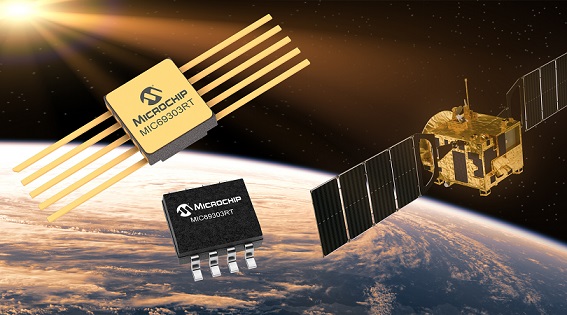Space system developers can quickly develop prototypes and final designs for their power management systems with a radiation-tolerant power management system based on a familiar plastic COTS device
The commercialisation of the Low-Earth Orbit (LEO) region is transforming space exploration and satellite communication at roughly 1,200 miles above Earth. For satellites to successfully operate and reach their destination, it is essential to select components that can withstand the harsh space environment.
To this end and building on its existing radiation-tolerant portfolio, Microchip Technology has introduced its first commercial-off-the-shelf (COTS) radiation tolerant power device with the MIC69303RT 3A Low-Dropout (LDO) Voltage Regulator. The new high-current, low-voltage MIC69303RT is a power management system targeting LEO and other space applications. The device is available in both plastic and hermetic ceramic to support the requirements of the mission that is being planned.
The MIC69303RT is based on proven COTS devices making it easier to conduct preliminary evaluation and early development. Operating from a single low voltage supply of 1.65 to 5.5 volts, the device can supply output voltages as low as 0.5V at high currents, offering high precision and ultra-low dropout voltages of 500 mV under extreme conditions. The MIC69303RT is a companion power source for Microchip’s radiation-tolerant space-qualified microcontrollers such as the SAM71Q21RT and PolarFire FPGAs including the RTPF500TLS.
“MIC69303RT is Microchip’s first rad-tolerant power management device with a hermetic ceramic package, latch up immunity and 50 Krad total dose robustness,” said Bob Vampola, vice president of Microchip’s aerospace and defense business unit. “Microchip has over 60 years of space flight heritage in a comprehensive portfolio that allows customers to choose products designed to work together and accelerate their design processes.”
According to Keith Pazul, director of marketing for Microchip’s analog power and interface business unit, this COTS radiation tolerant power management system enables new design possibilities in space applications.
“Customers can design their space system with confidence by selecting the COTS MIC69303RT space-qualified part to power Microchip space-qualified MCUs and FPGAs,” he says.
Designed for harsh aerospace applications, the MIC69303RT is operational in temperature ranges from -55°C to +125°C. It is offered in 8-pin and 10-pin package configurations with radiation tolerance up to 50 Krad. The low noise of the output is critical to sensitive RF circuits, post regulation of switching power supplies and industrial power applications.
Space Qualified
The MIC69303RT device is the latest in a range of different space and aerospace application qualified products from Microchip Technology and is manufactured in compliance with the MIL Class Q or Class V requirements, all of which require extensive environmental testing including screening tests, qualification testing and TCI/QCI specifications. The plastic MIC69303RT is compliant with high reliability plastic quality flow derived from AEC-Q100 automotive requirements with specific additional tests necessary for space applications.
In addition, the MIC69303RT Plastic Evaluation Board is designed to evaluate the performance of the plastic engineering IC version for the MIC69303RT. The 4-layer PCB allows the user to easily change and measure the electric parameters of the device at different input and output conditions, thus it is ideal for early development exercises and prototype qualification.
- UK manufacturing steps up to COVID-19 crisis - April 2, 2020
- Clustering Innovation - March 12, 2020
- A Global Monitor - March 6, 2020

